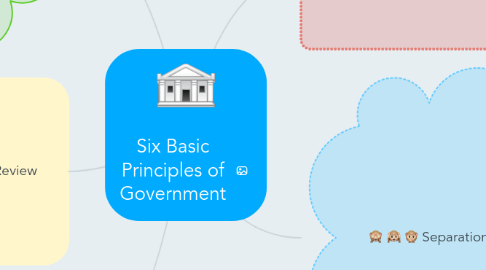Six Basic Principles of Government
von Taylor Beddow


1. Checks and Balances
1.1. Each branch has certain powers with which it can check the operations and balance the powers of the other two branches.
1.2. It's to keep one branch form getting too much power.
1.3. If one branch is higher up then the other two they either bring that branch down or build themselves up to be equal with the one branch.
2. Judicial Review
2.1. Has the power to decide what government does in accord with what the Constitution provides.
2.2. No government official is above the law of the citizens.
2.3. Judicial Review allows for the Judicial Branch to decide on punishments that government officials deserve.
3. Federalism
3.1. The division of power among central government and several regional governments.
3.2. The US has a state government and a national/federal government.
3.2.1. The state is in charge of the people within their state usually split up so one person doesn't control the whole state.
3.2.2. The federal government controls everyone who live in the nation.
4. Limited Government
4.1. Government is not all-powerful, it may only do those things that the people have given it power to do.
4.2. Government must be conducted according to constitutional principles.
4.3. This is all decided on by a majority of the population.
5. Separation of Powers
5.1. The Constitution distributes the powers of the national Government among the three branches of Government.
5.1.1. Judicial, Executive, and Legislative
5.1.1.1. Judicial: decides on the punishments for those who break the law.
5.1.1.2. Legislative: is in charge of making laws.
5.1.1.3. Executive: is in charge of enforcing the laws.
5.1.2. This allows each to focus on one job to do.
